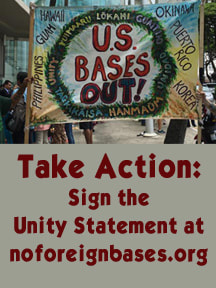 Click on the photo to visit the site.
Click on the photo to visit the site. The Alliance was a conference endorser, and Nancy organized the “Environment and Health” plenary specifically to highlight health impacts on military and civilian base personnel and surrounding communities, not just from the better-known threats of nuclear weapons, Agent Orange, depleted uranium and chemical/ biological agents, but from the “alphabet soup” of air, land and water pollution from all military base activities.
Plenary speaker Patricia Hynes makes clear in The Polluter Is Not Paying that it’s almost impossible to hold the U.S. military and government responsible and accountable in the US or anywhere else. Marie Cruz on the Navy Base in Vieques, Puerto Rico and Susan Schnall on Vietnam documented the many decades it took to negotiate some clean-up and compensation, noting that as extreme weather pummels U.S. installations, contamination and buried munitions are uncovered and spread.
The United States has as many as 1,000 military bases and tens of thousands of troops in more than 170 foreign countries, especially Germany, Japan and South Korea, as well as thirty-four Naval air carriers either operational or planned, each composed of roughly 7,500 personnel and 65 to 70 aircraft—literally floating military bases.
We pay more for “defense” at an annual cost of approximately $156 billion—money that could be used to support basic human needs (for instance, heat for the Baltimore public schools, where students endured classroom temperatures in the 30s at the start of January, while parents scrambled to fundraise for space heaters and childrens' coats).
The environmental costs include radioactive and chemical contamination of water, destruction of fisheries and farmland, and disruption of climate through massive output of greenhouse gasses. The social costs overseas include disruption of local communities and higher crime rates, including prostitution, rape and sexual abuse. Human rights abuse include using bases for extra-judicial imprisonment and torture.
Ultimately, our overseas bases are not bulwarks of national security, but intended to guarantee multinationals access to markets, resources and cheap labor. As the conference unity statement says, “We must all unite to actively oppose the existence of U.S. foreign military bases and call for their immediate closure. We invite all forces of peace, social and environmental justice to join us in our renewed effort to achieve this shared goal.”
You can learn more about the conference and watch videos of the conference sessions at http://noforeignbases.org/ or see shorter highlights here. The conference program book is online here, with biographies of the speakers.

 RSS Feed
RSS Feed
